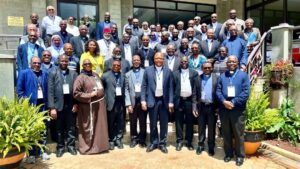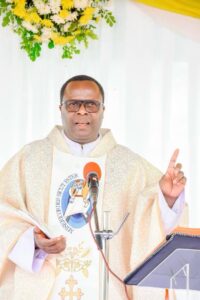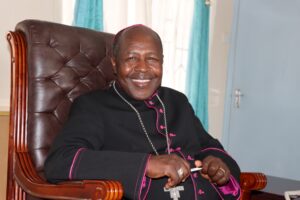AMECEA: Synthesis Report Advocates for Participation of Everyone in Church’s Mission
AMECEA Secretary General Rev. Fr Anthony Makunde
Sr. Jecinter Antoinette Okoth, FSSA
The Secretary General of the Association of Member Episcopal Conferences in Eastern Africa (AMECEA) has at a webinar summarized the Synthesis Report that was issued in Rome, 28 October 2023, at the close of the first phase of the synod on synodality, emphasizing that the synod calls for active participation of all the baptized in fulfilling the Church’s Mission.
“The 42 paged document that was circulated electronically to the entire church for the people to receive, read, reflect, and give feedback is divided into three parts summarizing the key issues that were discussed and voted for in the October 2023 synod assembly,” Fr. Anthony Makunde shared with over 100 participants during a webinar convened by AMECEA (AMECEA) in partnership with the Association of Consecrated Women in Eastern and Central Africa (ACWECA) the Pan-African Committee for Communication (CEPACS), and in collaboration with the African Synodality Initiative (ASI).
He explained on Thursday, March 14, that the parts of the Synthesis Report include, the face of the Synodal Church, all disciples, all missionaries and weaving bonds, building communities.
Expounding on the different parts of the report for the synod-themed; “For a Synodal Church: Communion, Participation and Mission,” Fr. Makunde who was at the XVI Ordinary General Assembly of the Synod of Bishops as one of the experts tasked with the responsibility to facilitate the Working Groups discussions during the assembly, pointed out that the feedback for the synthesis report should be submitted in eight pages, and testimonies of two pages, through the Episcopal conferences by 15th May 2024 to help in drafting of the second Instrumentum laboris (Working Document).
The first part which talks about the face of the Synodal Church, Fr. Makunde said, presents the characteristic features of a synodal church, the external manifestation, the distinctive features, and the outward look.
He said, “This part stresses the experience and desire for a church as God’s home, a family, a church closer to the lives of her people, less bureaucratic and more relational.” Besides, it calls for a “church that acknowledges our common dignity and common responsibility flowing from the sacraments of Christian initiation.”
Fr Makunde narrated further that this part of the report paints a picture of a Church that should be sensitive to those in need and committed to addressing the root causes of poverty and injustice and at the same time a “Church that accommodates cultural differences as a gift and committed to work for Christian unity.”
Addressing the online participants from across Africa on issues highlighted in the second part of the synthesis report that reminds the people of God that all are disciples and missionaries in the Church, the AMECEA Secretary General narrates, “Since the church has a mission and to the Church ‘is’ mission, all those initiated and take part in the church including the laity, religious and clergy share the mission that is realized in different charisms and vocations. Hence to ensure harmony, “there is a need to consider the relationship between charisms and ministries.”
The second part of the synthesis report Fr. Makunde narrates further, “acknowledges that lay people’s role has recently gone beyond sanctification of temporal goods. The Church needs to define the roles played by the lay people in the church of today.” In this case, the Church is open for new ministries as per the needs of local churches.
“More space is called for women in decision-making fora since their role in the church is highly acknowledged but they are also victims of abuse, injustices, and conflicts,” Fr. Makunde explained adding that, “There is an open call to revisit the guidelines regarding the relationship between bishops and the Religious in the Church.”
The third part that presents a road map for forming a synodal Church is titled ‘Weaving Bonds, Building Communities’.
Fr. Makunde who had explained earlier after the first assembly that the spirit of the Synod was very impressive and that the unique methodology that was used allowed each participant to speak and to be listened to, reminded the participants that the synthesis report “desires to enable each person to participate actively in the Church’s mission according to his/her own charism.”
The report advocates for “proper formation both in the initial and ongoing formation in various levels, promotes a culture of lifelong formation and learning using the available resources including digital options and acknowledges open questions that need deep reflection and research from theological, ethical, social and anthropological angles,” the Secretary-General said.


